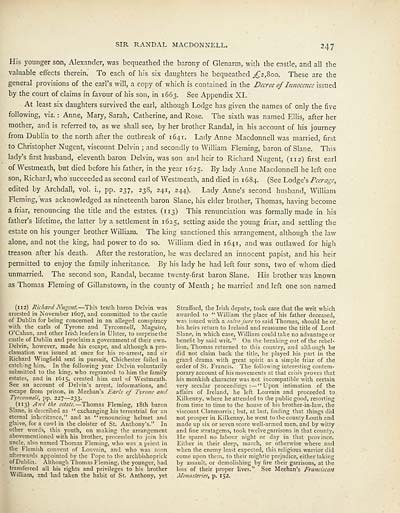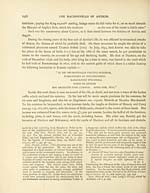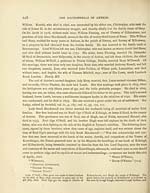Historical account of the Macdonnells of Antrim
(261) Page 247
Download files
Complete book:
Individual page:
Thumbnail gallery: Grid view | List view

SIR RANDAL MACDONNELL. 247
His younger son, Alexander, was bequeathed the barony of Glenarm, with the castle, and all the
valuable effects therein. To each of his six daughters he bequeathed .-£2,800. These are the
general provisions of the earl's will, a copy of which is contained in the Decree of Innocence issued
by the court of claims in favour of his son, in 1663. See Appendix XL
At least six daughters survived the earl, although Lodge has given the names of only the five
following, viz. : Anne, Mary, Sarah, Catherine, and Rose. The sixth was named Ellis, after her
mother, and is referred to, as we shall see, by her brother Randal, in his account of his journey
from Dublin to the north after the outbreak of 1641. Lady Anne Macdonnell was married, first
to Christopher Nugent, viscount Delvin ; and secondly to William Fleming, baron of Slane. This
lady's first husband, eleventh baron Delvin, was son and heir to Richard Nugent, (112) first earl
of Westmeath, but died before his father, in the year 1625. By lady Anne Macdonnell he left one
son, Richard; who succeeded as second earl of Westmeath, and died in 1684. (See Lodge's Peerage,
edited by Archdall, vol. i., pp. 237, 238, 241, 244). Lady Anne's second husband, William
Fleming, was acknowledged as nineteenth baron Slane, his elder brother, Thomas, having become
a friar, renouncing the title and the estates. (113) This renunciation was formally made in his
father's lifetime, the latter by a settlement in 1625, setting aside the young friar, and settling the
estate on his younger brother William. The king sanctioned this arrangement, although the law
alone, and not the king, had power to do so. William died in 1641, and was outlawed for high
treason after his death. After the restoration, he was declared an innocent papist, and his heir
permitted to enjoy the family inheritance. By his lady he had left four sons, two of whom died
unmarried. The second son, Randal, became twenty-first baron Slane. His brother was known
as Thomas Fleming of Gillanstown, in the county of Meath ; he married and left one son named
(112) Richard Nugent— -This tenth baron Delvin was Strafford, the Irish deputy, took care that the writ which
arrested in November 1607, and committed to the castle awarded to "William the place of his father deceased,
of Dublin for being concerned in an alleged conspiracy was issued with a salvo jure to said Thomas, should he or
with the earls of Tyrone and Tyrconnell, Maguire, his heirs return to Ireland and reassume the title of Lord
O'Cahan, and other Irish leaders in Ulster, to surprise the Slane, in which case, William could take no advantage or
castle of Dublin and proclaim a government of their own. benefit by said writ." On the breaking out of the rebel-
Delvin, however, made his escape, and although a pro- lion, Thomas returned to this country, and although he
clamation was issued at once for his re-arrest, and sir did not claim back the title, he played his part in the
Richard Wingfield sent in pursuit, Chichester failed in grand drama with great spirit as a simple friar of the
catching him. In the following year Delvin voluntarily order of St. Francis. The following interesting contem-
submitted to the king, who regranted to him the family porary account of his movements at that crisis proves that
estates, and in 161 5, created him earl of Westmeath. his monkish character was not incompatible with certain
See an account of Delvin's arrest, informations, and very secular proceedings: — "Upon intimation of the
escape from prison, in Median's Earls of Tyrone and affairs of Ireland, he left Louvain and proceeded to
Tyrconnell, pp. 227 — 233. Kilkenny, where he attended to the public good, resorting
(113) And the estate. — Thomas Fleming, 18th baron from time to time to the house of his brother-in-law, the
Slane, is described as "exchanging his terrestrial for an viscount Clanmorris; but, at last, finding that things did
eternal inheritance," and as "renouncing helmet and not prosper in Kilkenny, he went to the county Louth and
glaive, for a cowl in the cloister of St. Anthony's." In made up six or seven score well-armed men, and by witty
other words, this youth, on making the arrangement and fine stratagems, took twelve garrisons in that county,
abovementioned with his brother, proceeded to join his He spared no labour night or day in that province,
uncle, also named Thomas Fleming, who was a priest in Either in their sleep, march, or otherwise where and
the Flemish convent of Louvain, and who was soon when the enemy least expected, this religious warrior did
afterwards appointed by the Tope to the archbishoprick come upon them, to their mightie prejudice, either taking
of Dublin. Although Thomas Fleming, the younger, had by assault, or demolishing by fire their garrisons, at the
transferred all his rights and privileges to his brother loss of their proper lives." See Median's Franciscan
William, and had taken the habit of St. Anthony, yet Monasteries, p. 152.
His younger son, Alexander, was bequeathed the barony of Glenarm, with the castle, and all the
valuable effects therein. To each of his six daughters he bequeathed .-£2,800. These are the
general provisions of the earl's will, a copy of which is contained in the Decree of Innocence issued
by the court of claims in favour of his son, in 1663. See Appendix XL
At least six daughters survived the earl, although Lodge has given the names of only the five
following, viz. : Anne, Mary, Sarah, Catherine, and Rose. The sixth was named Ellis, after her
mother, and is referred to, as we shall see, by her brother Randal, in his account of his journey
from Dublin to the north after the outbreak of 1641. Lady Anne Macdonnell was married, first
to Christopher Nugent, viscount Delvin ; and secondly to William Fleming, baron of Slane. This
lady's first husband, eleventh baron Delvin, was son and heir to Richard Nugent, (112) first earl
of Westmeath, but died before his father, in the year 1625. By lady Anne Macdonnell he left one
son, Richard; who succeeded as second earl of Westmeath, and died in 1684. (See Lodge's Peerage,
edited by Archdall, vol. i., pp. 237, 238, 241, 244). Lady Anne's second husband, William
Fleming, was acknowledged as nineteenth baron Slane, his elder brother, Thomas, having become
a friar, renouncing the title and the estates. (113) This renunciation was formally made in his
father's lifetime, the latter by a settlement in 1625, setting aside the young friar, and settling the
estate on his younger brother William. The king sanctioned this arrangement, although the law
alone, and not the king, had power to do so. William died in 1641, and was outlawed for high
treason after his death. After the restoration, he was declared an innocent papist, and his heir
permitted to enjoy the family inheritance. By his lady he had left four sons, two of whom died
unmarried. The second son, Randal, became twenty-first baron Slane. His brother was known
as Thomas Fleming of Gillanstown, in the county of Meath ; he married and left one son named
(112) Richard Nugent— -This tenth baron Delvin was Strafford, the Irish deputy, took care that the writ which
arrested in November 1607, and committed to the castle awarded to "William the place of his father deceased,
of Dublin for being concerned in an alleged conspiracy was issued with a salvo jure to said Thomas, should he or
with the earls of Tyrone and Tyrconnell, Maguire, his heirs return to Ireland and reassume the title of Lord
O'Cahan, and other Irish leaders in Ulster, to surprise the Slane, in which case, William could take no advantage or
castle of Dublin and proclaim a government of their own. benefit by said writ." On the breaking out of the rebel-
Delvin, however, made his escape, and although a pro- lion, Thomas returned to this country, and although he
clamation was issued at once for his re-arrest, and sir did not claim back the title, he played his part in the
Richard Wingfield sent in pursuit, Chichester failed in grand drama with great spirit as a simple friar of the
catching him. In the following year Delvin voluntarily order of St. Francis. The following interesting contem-
submitted to the king, who regranted to him the family porary account of his movements at that crisis proves that
estates, and in 161 5, created him earl of Westmeath. his monkish character was not incompatible with certain
See an account of Delvin's arrest, informations, and very secular proceedings: — "Upon intimation of the
escape from prison, in Median's Earls of Tyrone and affairs of Ireland, he left Louvain and proceeded to
Tyrconnell, pp. 227 — 233. Kilkenny, where he attended to the public good, resorting
(113) And the estate. — Thomas Fleming, 18th baron from time to time to the house of his brother-in-law, the
Slane, is described as "exchanging his terrestrial for an viscount Clanmorris; but, at last, finding that things did
eternal inheritance," and as "renouncing helmet and not prosper in Kilkenny, he went to the county Louth and
glaive, for a cowl in the cloister of St. Anthony's." In made up six or seven score well-armed men, and by witty
other words, this youth, on making the arrangement and fine stratagems, took twelve garrisons in that county,
abovementioned with his brother, proceeded to join his He spared no labour night or day in that province,
uncle, also named Thomas Fleming, who was a priest in Either in their sleep, march, or otherwise where and
the Flemish convent of Louvain, and who was soon when the enemy least expected, this religious warrior did
afterwards appointed by the Tope to the archbishoprick come upon them, to their mightie prejudice, either taking
of Dublin. Although Thomas Fleming, the younger, had by assault, or demolishing by fire their garrisons, at the
transferred all his rights and privileges to his brother loss of their proper lives." See Median's Franciscan
William, and had taken the habit of St. Anthony, yet Monasteries, p. 152.
Set display mode to:
![]() Universal Viewer |
Universal Viewer | ![]() Mirador |
Large image | Transcription
Mirador |
Large image | Transcription
Images and transcriptions on this page, including medium image downloads, may be used under the Creative Commons Attribution 4.0 International Licence unless otherwise stated. ![]()
| Histories of Scottish families > Historical account of the Macdonnells of Antrim > (261) Page 247 |
|---|
| Permanent URL | https://digital.nls.uk/95344379 |
|---|
| Description | A selection of almost 400 printed items relating to the history of Scottish families, mostly dating from the 19th and early 20th centuries. Includes memoirs, genealogies and clan histories, with a few produced by emigrant families. The earliest family history goes back to AD 916. |
|---|

